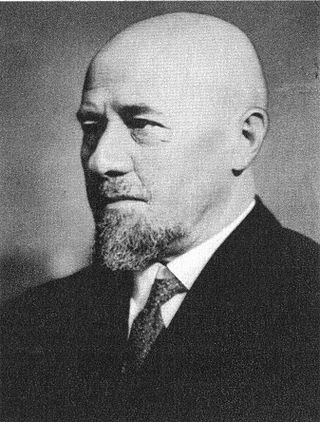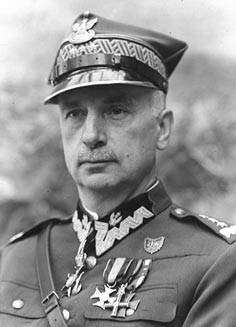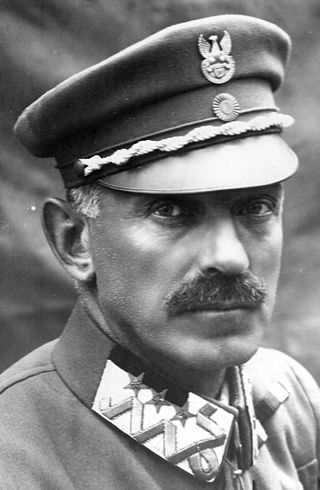
Stanisław Car (26 April 1882 – 18 June 1938) was a Polish politician, lawyer, Marshal of the Sejm, deputy Prime Minister and the Minister of Justice.

Stanisław Car (26 April 1882 – 18 June 1938) was a Polish politician, lawyer, Marshal of the Sejm, deputy Prime Minister and the Minister of Justice.
Born on 26 April 1882 into a Warsaw middle-class family, he studied law at the University of Warsaw (until 1905), and then at the University of Odessa, where he graduated in 1907. In 1908–1911, Car worked as a clerk in a court, opening then his own legal office. In 1915, he became a judge, and a member of the Commission of Civil Law of the Provisional Council of State.
For most of the 1920s, Car worked in his office. In 1924, he opened a magazine of Warsaw lawyers, “Palestra”, of which he was the first editor in chief. After the May Coup of 1926, he returned to politics. A close associate of Jozef Pilsudski, he remained loyal to the Polish Marshal until Pilsudski's death in May 1935.
Car was a prominent member of the pro-Sanacja party Nonpartisan Bloc for Support of Reforms (BBWR). He co-wrote the April Constitution of Poland.
Stanislaw Car died in Warsaw on 18 June 1938.

Stanisław Wojciechowski was a Polish politician and scholar who served as President of Poland between 1922 and 1926, during the Second Polish Republic.

Józef Oleksy was a Polish left-wing politician who served as Prime Minister of Poland from 7 March 1995 to 7 February 1996, when he resigned due to espionage allegations. He was chairman of the Democratic Left Alliance.

Marshal Edward Rydz-Śmigły also called Edward Śmigły-Rydz, was a Polish politician, statesman, Marshal of Poland and Commander-in-Chief of Poland's armed forces, as well as a painter and poet.

Kazimierz Stanisław Świtalski was a Polish politician, diplomat, soldier, military officer in the Polish Legions and 18th Prime Minister of Poland between April and December 1929.

The Order of Polonia Restituta is a Polish state order established 4 February 1921. It is conferred on both military and civilians as well as on foreigners for outstanding achievements in the fields of education, science, sport, culture, art, economics, national defense, social work, civil service, or for furthering good relations between countries. It is Poland's second-highest civilian state award in the order of precedence, behind the Order of the White Eagle.

Felicjan Sławoj Składkowski was a Polish physician, general, and politician who served as Minister of Internal Affairs and as the 28th Prime Minister of Poland before and at the Outbreak of World War II.

Marian Zyndram-Kościałkowski was a Polish politician, freemason and military officer who served as voivode of Białystok Voivodeship in 1930-1934, Mayor of Warsaw in 1934 and 27th Prime Minister of Poland from 1935 to 1936.

Walery Jan Sławek was a Polish politician, freemason, military officer and activist, who in the early 1930s served three times as Prime Minister of Poland. He was one of the closest aides of Polish leader, Józef Piłsudski.

Aleksander Błażej Prystor was a Polish politician, activist, soldier and freemason, who served as 23rd Prime Minister of Poland from 1931 to 1933. He was a member of the Combat Organization of the Polish Socialist Party and in 1908 took part in the Bezdany raid. Between 1912 and 1917 he spent in Russian prisons before being released in 1917. In March 1917 he joined Polish Military Organisation. After independence, he became secretary in the Ministry of Labour and Social Welfare. He fought as a volunteer in the Polish–Soviet War of 1919–1920. He worked for a few ministries. Between 1931 and 1933 he served as Prime Minister of Poland. After that, he became the Marshal of the Polish Senate 1935–1938.

Marian Włodzimierz Kukiel was a Polish major general, historian, social and political activist.

Major Wanda Gertz was a Polish woman of noble birth, who began her military career in the Polish Legion during World War I, dressed as a man, under the pseudonym of "Kazimierz 'Kazik' Żuchowicz". She subsequently served in the Ochotnicza Legia Kobiet of the Polish Armed Forces during the Polish–Soviet War. In the interwar period she became a reserve officer but faced discrimination and was stripped of her officer rank. She worked closely with Marshal Piłsudski and remained an activist in the cause of women in the military.

General Wacław Jędrzejewicz was a Polish Army officer, diplomat, politician and historian, and subsequently an American college professor.

General Kazimierz Sosnkowski was a Polish independence fighter, general, diplomat, and architect.

Stanisław Maria Jan Teofil Szeptycki was a Polish count, general and military commander.

Stanislav Gilyarovich Poplavsky was a general in the Soviet and Polish armies.

Tadeusz Adam Kasprzycki was a member of the Polish Legions in First World War, major general of the Polish Armed Forces from 1929 and Minister of Military Affairs of Poland from 1935 to 1939. He commanded the 12th Infantry Division from 1927 to 1931.
Jan Zygmunt Emil Berek (1896–1986) was a soldier of the Austro-Hungarian Army and Generał brygady of the Polish Army, who fought in World War I, Polish–Soviet War and the Invasion of Poland.

Kazimiera Iłłakowiczówna was a Polish poet, prose writer, playwright and translator. She was one of the most acclaimed and celebrated poets during Poland's interwar period.

Bogdan Franciszek Serwacy Hutten-Czapski h. Leliwa was a Polish Count, politician, curator of the University of Warsaw and the Warsaw University of Technology, President of the Association of Polish Knights of Malta. Bogdan was the grandson of two Polish generals – Józef Grzegorz Longin Hutten-Czapski (1760–1810) and Stanisław Kostka Mielżyński (1778–1826), associate of Kaiser Wilhelm II, and servant of the Kingdom of Prussia until the end of WWI.
Stanisław Wyganowski was a politician, economist and urban planner. From 1990 to 1994, he was the mayor of Warsaw, Poland, and in 1990 was also the voivode of the Warsaw Voivodeship.